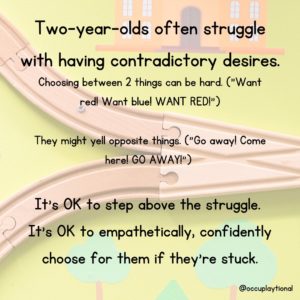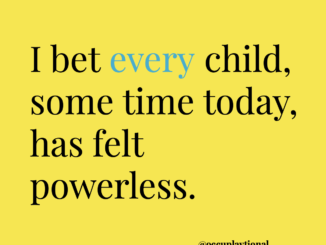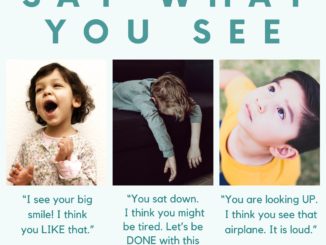
It’s “trendy” to offer your kid choices. 😉 It’s one of the easy, catchy, go-to parenting “tips and tricks” that I guarantee you’d see on almost any advice article, book, or even just talking to another parent. “Your kid feels like they don’t have enough power, offer them choices!”
(Sometimes this spirals into giving them a zillion meaningless choices all day long, and kids can tell when they’re being pandered to.)
But this is me being even more specific than that: this is me specifically talking about two-year-olds. Sure, your 1yo or your 3yo might be like this. Even your 8yo might be like this, although they’re not really the subject of this post. I’m not talking about *your* specific kid, necessarily, but I’m talking about a developmental norm: it is developmentally normal for 2yos to struggle with having conflicting desires in their own self.
This is often the first age where they realize that choosing X over Y means they don’t get Y! The toddler FOMO (fear of missing out) is hardcore. “If I choose Mom to do my bathtime, then I won’t get bathtime with Dad?!!?! But if I choose Dad then I won’t get Mom?!!?? WAAAH! BOTH CHOICES ARE MISSING OUT!”
This is also the age of emerging capacity to self-advocate — or, to put it in less jargon, this is often the first time in their lives that they can really start to tell you what they want. But communicating for the purpose of being understood (as opposed to just kind of for the heck of it) also means that they start refining what’s going on in their own mind. “Wait, if I tell Papa what fruit I want with lunch, I will really get to eat that fruit! Communicating really works and it’s *for* something! …Dang, I better think really hard about what fruit I want to eat…OMG IT’S SUCH A BIG CHOICE”
The mind is a confusing place and they are so small! It’s hard to untangle all those big complicated thoughts and emotions and it’s even harder to parse all that down into words. It makes total sense that these little people struggle with this.
As their parent, caretaker, teacher, or other adult — you don’t have to let yourself get all emotionally wrapped up in this struggle, though. You can notice a pattern of frustration with choices and reduce choices, trusting that your child will let you know when they’re ready to choose things that are actually important to them. You can help them get un-stuck when they get stuck. You can give them a safe and empathetic ear when they’re frustrated. You can ride through the storm, knowing that it’s a normal part of life and that they’ll come out the other side.



